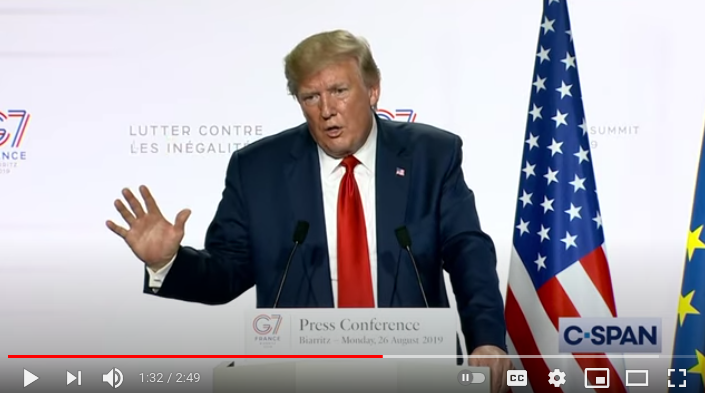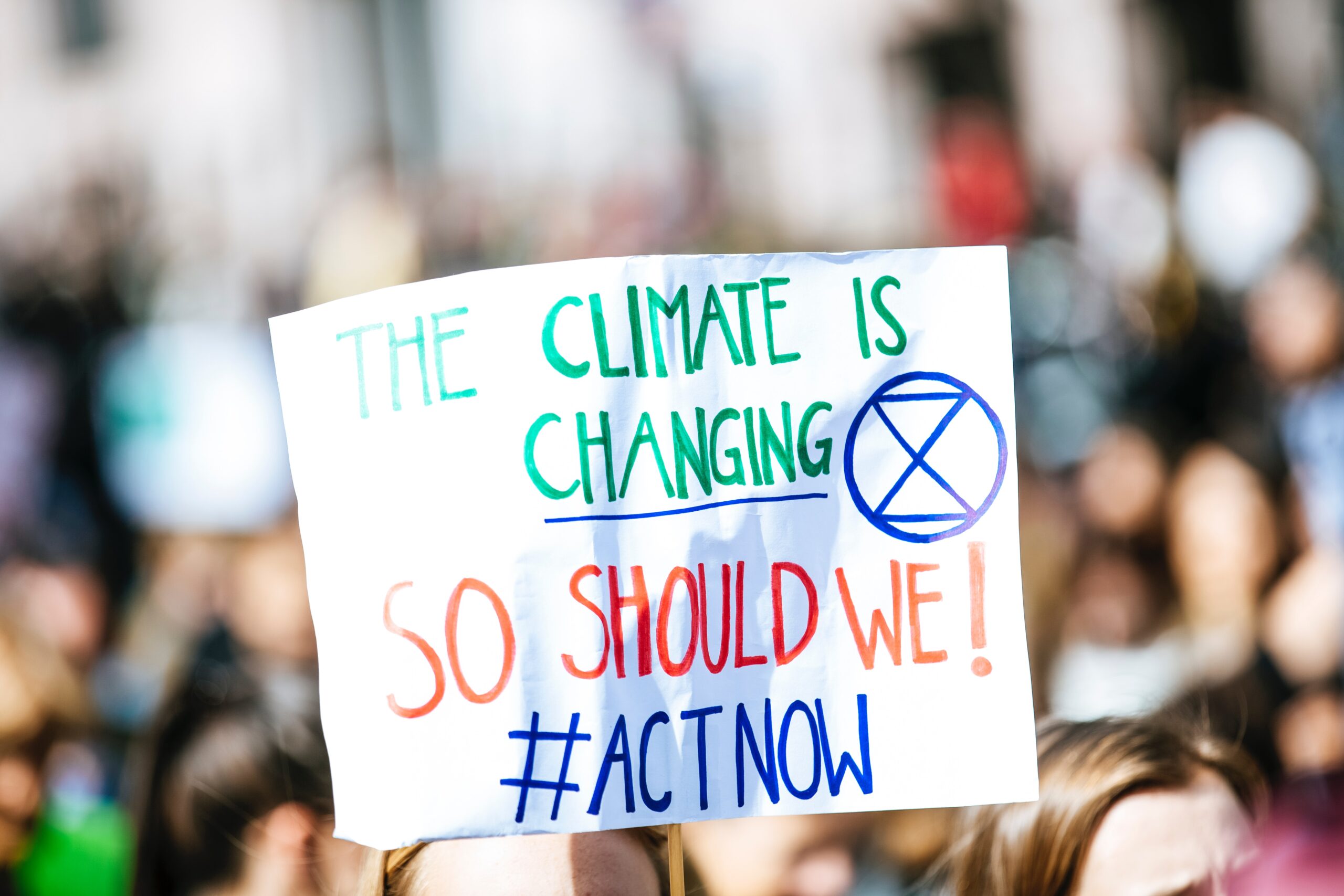Introduction
While last year’s attention was primarily focused on the ongoing Coronavirus pandemic, 2020 was also a major year for the climate, and not in a positive way. Starting off with the Australian wildfires, the disastrous hurricane season, the California wildfires and more. In an article for the Scientific American, Andrea Thompson writes that the Trump administration had already “rolled back numerous environmental regulations, including several that are key to reigning in greenhouse gas emissions” before president Joe Biden was elected (Thompson). Thompson also notes that 2020 was the hottest year on record since 2016.
As it is a global issue, climate change is a problem that needs to be dealt with as swiftly and safely as possible. Countries also deserve leaders who are knowledgeable about these topics. During a press conference in 2019, Donald Trump was asked numerous questions about climate change that he never fully answered, let alone truthfully. The president of the United States is someone whom the country should be able to trust, especially about major issues like climate change. With an obvious political bias and a previous history of spreading false information, former president Donald Trump made quite a few untruthful claims.
1. “I feel the United States has tremendous wealth. The wealth is under its feet. I made that wealth come alive.” (0:18)
When asked his opinion on what the country itself could or should be doing about climate change, Trump brought the question around to the amount of money the United States has. Although he has claimed that he has made the country more rich, only citizens who were already wealthy had obtained more money. According to politician Bernie Sanders, while the former president was in office, “the five richest people in America [saw] their wealth go up by over $100bn”, as well as the announcement of corporations making “over $1tn in stock buybacks in 2018 alone”(Sanders). While in 2018, the average wage for a working-class employee were only up by about 1.2%, or about $9.11 (Sanders). Even throughout the past four decades, the economy has been this way.
Adding on to this, since the late seventies, “the bottom 90% of Americans have seen their share of national income decline from 58% to 46% costing them nearly $11,000 per household” (Sanders). During his presidency, Trump may have made some citizens more wealthy, but that certainly does not go for the country as a whole.
2. “We [the US] are now the number one energy producer in the world.” (0:37)
Still not having answered the question about climate change from the claim above, Trump goes on to state that the United States is the number one energy producer in the world. While the country is first in a few categories, it isn’t in energy. In an article for the Smithsonian Magazine, Mark Finely explains that the US is the biggest oil and gas supplier, but that only accounts for “17% and 23%, respectively, of the global totals” (Finley). In fact, China is actually “the world’s biggest producer of hydroelectricity and other renewables” as well as “the world’s biggest producer of [both] wind and solar energy” (Finley).
The reason for this is actually coal production, which is larger than the United States’ natural gas, oil, and coal production all together (Finely). While both countries are top energy producers, by simply looking at the statistics, one can see that China is indeed first.
3. “I think I know more about the environment than most people.” (1:56)
After stating that he wants the United States to have the worlds’ safest and cleanest air and water, Trump goes on to claim that he knows more about the environment than most people do. Clearly, the former president does not know more than the average person, otherwise he would not have taken the specific actions to worsen the environment. In September of 2020, his statement was proven false when the former president discussed the California wildfires with scientists. Writing for the Associated Press, Ellen Knickmeyer and others explain that although there was an actual scientific consensus that climate change played a major role in the fires, he simply stated that the blame should be put on the failure to clear dead timber and unraked leaves (Knickmeyer, Ellen, et al). The solution is not that simple. In response to the president, Secretary Wade Crowfoot stated that if science is ignored and everyone “sort of put our head[s] in the sand and think it’s all about vegetation management, we’re not going to succeed together protecting Californians.” Trump had replied with, “It’ll get cooler, just you watch”. Crowfoot went on to state that he wished science was in agreement with the president (qtd. in Knickmeyer, Ellen, et al). If Donald Trump knew anything about the environment and climate change at all, he would not insist that the California wildfires were caused by unranked forest leaves, let alone that the climate of the Earth will simply cool down.

4. “I’m not gonna lose that wealth. [..] On windmills. Which frankly, aren’t working too well.” (1:17)
Towards the end of the interview, the former president was referring to climate change, the wealth of the country, and that windmills weren’t serving their proper purpose; referring to a potential solution to climate change as some kind of ‘dream’. While global warming and climate change are very much real problems, Trump was partially correct with his statement about windmills. They are a good source for renewable energy, but could have a negative effect in the future.
According to Michael Drexler at the World Economic Forum, “Renewable energy has reached a tipping point—it now constitutes the best chance to reverse global warming”(qtd. in Eschner). Costs will continue to fall as the competition between solar and wind power rises. Additionally, reporter Micheal Schirber explains that “The initial investment for wind energy is huge, but developments in wind power technology, [and a] wider acceptance of wind as a method for producing power, have brought the price of wind power […] down to a point where it’s lower than building new fossil-fuel power plants” (qtd. in Eschner). As for the Earth itself, it was found that “if wind supplied 10 percent of expected global electricity demand in 2100, the resulting change in the atmosphere’s energy might cause some regions of the world to experience temperature changes of approximately [33.8ºF]” (Eschner). While government spending money definitely should be put into helping stop climate change, windmills don’t necessarily help the global problem as much as many may believe.
5. “I want the cleanest water on Earth. I wanted the cleanest air on Earth. And that’s what we’re doing. I’m an environmentalist.” (1:30)
Lastly, in the interview the president had claimed that he wants the United States to have the world’s cleanest and safest air and water. However, under the Trump administration, the quality of air and water in the US has noticeably worsened. A writer for the Insider, Hilary Brueck, says that despite his claims of being an environmentalist, Trump “[had] rolled back at least 10 air-pollution and emissions rules while [he was] president, according to the New York Times” (Brueck). Adding on, the Environmental Performance Index says that “the US [is in] 10th place when it comes to overall air quality (Australia is first)” (qtd. in Brueck).
Back in June of 2019, the Associated Press had also reported that the “federal Environmental Protection Agency (EPA) data and found that ‘there were 15% more days with unhealthy air in America both last year and the year before than there were during the period from 2013 to 2016”, once again suggesting that while Trump was in office, the air quality significantly worsened. Besides, no singular country could have the ‘cleanest and/or air and water in the world’, as there is only one Earth, as everyone shares the same recycled resources.
Conclusion
The former president of the United States of America has spread false information many more times than just once; and not just about climate change and global warming. A president’s job and responsibility is to keep the public safe and informed, which he most certainly did not. While president, Donald Trump took many actions to ensure that global warming would worsen. For example, stating that he believes that the cause of the California wildfires is simply unranked forest leaves scientifically proven to be false. No matter one’s individual opinion on climate change, the government’s goal should be to protect and keep its people safe and informed. Not taking action to stop an already major problem could lead to many more worse problems for the future generations.
Featured image by Markus Spiske via Pexels
Works Cited
Beam, Adam and Andrew Selsky. “Easing Fires is Not As Simple As Climat Change Vs. Forest Work.” AP, The Associated Press, 14 Sept. 2020, apnews.com/article/wildfires-climate-cha nge-climate-oregon-washington-redskins-49d872e449c66aa7a0a9c047a00a738f.
Brueck, Hilary. “President Trump Keeps Falsely Saying the US has the ‘World’s Cleanest and Safest Air.’ Actually, He’s Making Pollution Worse.” Insider, Insider Inc., 4 Sept. 2019, www.businessinsider.com/does-the-us-have-the-cleanest-air-in-the-world-2018-10.
Bryce, Emma. “America’s Greenest Presidents.” The New York Times, 20 Sept. 2012, www.green. blogs.nytimes.com/2012/09/20/americas-greenest-presidents.
Eschner, Kat. “Two Myths and One Truth About Wind Turbines.” Smithsonian Magazine, 15 Jun. 2017, www.smithsonianmag.com/smart -news/two-myths-and-one-truth-about-wind-turbin es-180963626/.
Finley, Mark. “Shock Finding? China Is The World’s Biggest Energy Producer.” Forbes, 19 Jun. 2020, www.forbes.com/sites/thebakersinst itute/2020/06/19/todays-quiz-who-is-the-worlds- largest-energy-producer/?sh=461420287c13.
Knickmeyer, Ellen, et al. “Trump Spurns Science on Climate: ‘Don’t Think Science Knows.’” AP, The Associated Press, 14 Sept. 2020, www.apnews.com/article/climate-climate-change-elections- joe-biden-campaigns-bd152cd786b58e45c61bebf2457f9930.
Sanders, Bernie. “Trump’s Economy is Great For Billionaires, Not For Working People.” The Guardian, Guardian New & Media LImited, 16 Jan. 2019, www.theguardian.com/us-news /2019/jan/16/trump-economy-billionaires-working-people.
Thompson, Andrea. “The Top Five Climate Stories of 2020.” Scientific American, 22 Dec. 2020, www.scientificamerican.com/article/the-top-five-climate-stories-of-20201/.

